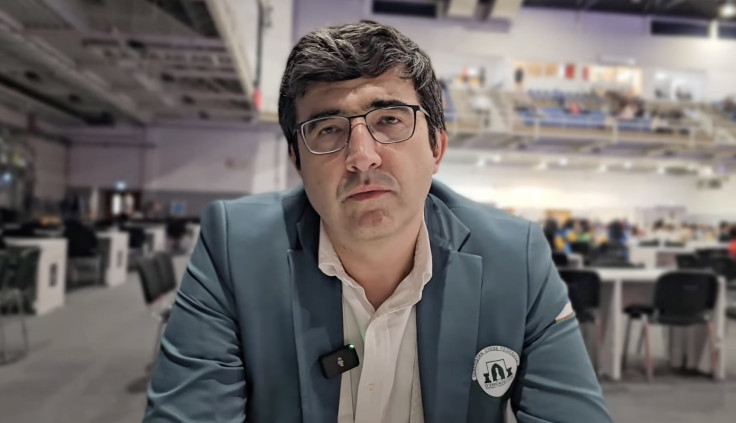Quick Facts On The Kramnik, Naroditsky Feud That's Now Being Blamed As Latter's Cause Of Death: How It Started And The Scandal That Followed
FIDE launched an ethics inquiry into Kramnik as the chess community debates accountability and player welfare

The death of American chess grandmaster Daniel Naroditsky at the age of 29 has shocked the international chess community. The tragedy has renewed attention on his long and bitter dispute with former world champion Vladimir Kramnik, whose public cheating accusations are now being examined in a very different light.
As tributes pour in for Naroditsky, the conversation within chess has shifted to whether the intense pressure of online scrutiny contributed to his death. The case has raised broader questions about mental health, responsibility and the ethics of public allegations in one of the world's most cerebral sports.
For a sport built on logic and composure, the fallout from this feud has exposed the emotional toll faced by players under public scrutiny.
Kramnik–Naroditsky Dispute
In October 2024, former world champion Kramnik publicly accused American grandmaster Naroditsky of using computer assistance during online matches. He shared statistical analyses suggesting Naroditsky's performances were 'implausibly perfect' but offered no verifiable proof, according to The Washington Post.
Naroditsky firmly denied the claims, calling them a 'sustained attack' on his reputation and mental health. The controversy deepened as Kramnik continued to post detailed charts and commentary online, intensifying the pressure on his American counterpart.
Several leading players and officials criticised Kramnik's conduct, and The International Chess Federation (FIDE) referred his public statements to its Ethics and Disciplinary Commission for review, citing concerns about harassment and reputational harm, according to CBS News.
Naroditsky's Death
On 19 October 2025, Naroditsky was found dead at his home in North Carolina. Authorities reported no signs of foul play and described the death as sudden and under investigation, AP News reported. The news stunned the chess world, where Naroditsky was widely regarded as a respected player, coach and online commentator.
Hours before his death, he appeared on a livestream speaking about the emotional strain of repeated accusations. While no official link has been established between the controversy and his death, several leading players and FIDE officials have raised concerns about the mental health toll of public harassment, according to The Guardian.
Chess Reputation and Ethics
The Kramnik–Naroditsky affair has forced chess to confront the consequences of unverified public accusations and the responsibilities that come with influence. Critics say the case illustrates how reputations can be damaged in the digital age.
A public petition calling on FIDE to revoke Kramnik's titles and open formal disciplinary proceedings has gained more than 35,000 signatures. The campaign, which also urges the resignation of FIDE chief executive Emil Sutovsky, reflects growing pressure on chess authorities to address ethics and accountability in the wake of Naroditsky's death.
Naroditsky's death has intensified calls for stronger mental health support and ethical oversight in online competition. FIDE's investigation into Kramnik is seen as a test of whether governing bodies will enforce standards beyond formal tournament play, according to NPR.
@CNN @Reuters @euronews @guardian @figaro @derspiegel @nytimes @ABC @LeTemps @elpaisinenglish @FoxNews @FIDE_chess pic.twitter.com/pwzRBvJa6S
— Vladimir Kramnik (@VBkramnik) October 25, 2025
More than 12,000 have signed a petition to ban Kramnik and revoke his title. https://t.co/psa8Z2SMJM
— Tarjei J. Svensen (@TarjeiJS) October 24, 2025
just shouldn't be about Kramnik. If you maliciously make cheating accusations with no evidence, your title should be revoked. Not the world champ title. He won that. Nothing will change that. But he is bringing the game into disrepute.
— Gadgetify (@Gdgtify) October 24, 2025
Kramnik is not to blame for this, chess needs people who are always raising these issues, that is the elite of the sport. Naroditsky was ill, and the discussion should have been about his illness.
— Kabele Chevas (@kalebe_chaves) October 25, 2025
Kramnik did not cause this death, and to say so is to betray the deceased, RIP.
— JD Eadon (@JDEadonWriter) October 25, 2025
Chess has dark secrets, and Kramnik is a villain, but also a scapegoat, a whistleblower.#Chess
A Community in Reflection
What began as a dispute over alleged cheating has become a defining test for the chess world's approach to ethics and accountability. The circumstances surrounding Naroditsky's death have prompted renewed scrutiny of how public allegations are handled and what support exists for players under pressure.
As the Kramnik inquiry continues, the sport's governing bodies face growing pressure to strengthen mental health protocols and enforce accountability measures for online behaviour. The outcome may shape future expectations for transparency, responsibility and player welfare within professional chess.
© Copyright IBTimes 2025. All rights reserved.





















